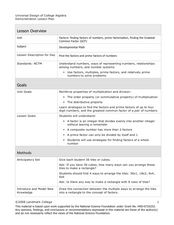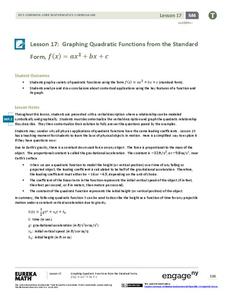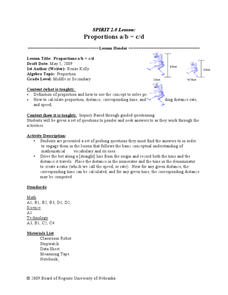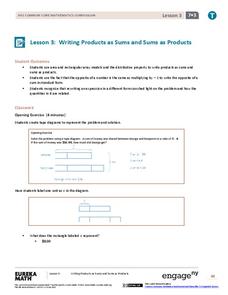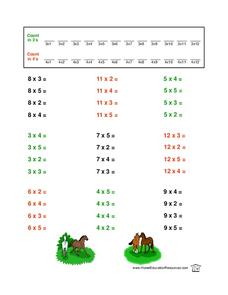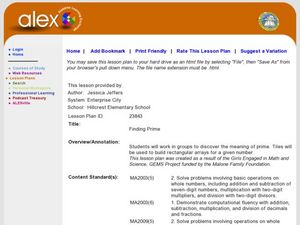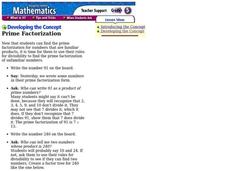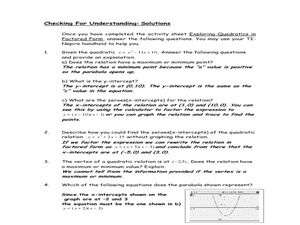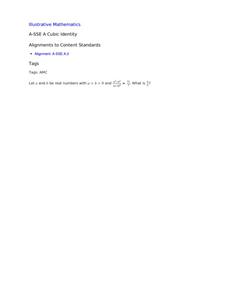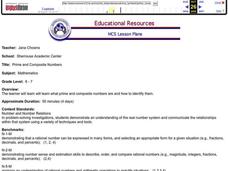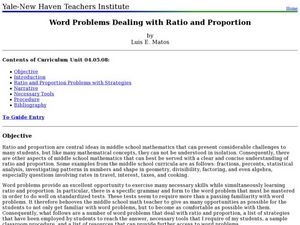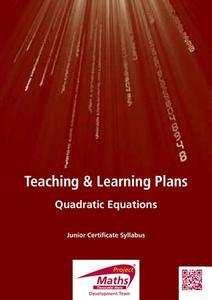Curated OER
Find the Factors and Prime Factors
Show the class how to find the factors of numbers. They use a variety of strategies, including unifix cubes, to find the factors of a whole number. This resource includes clear procedure to follow. Included are an anticipatory set,...
EngageNY
Graphing Quadratic Functions from the Standard Form
Use context to explain the importance of the key features of a graph. When context is introduced, the domain and range have meaning, which enhances understanding. Pupils use application questions to explore the key features of the graph...
Curated OER
Proportions a/b=c/d
Young scholars calculate distance and proportion of objects. For this algebra lesson, students define proportion and how it is used in math. They solve the problem through guided instruction.
Curated OER
Functions and Roots
In this function worksheet, students factor polynomials, or use the FOIL method, to simplify polynomials and determine the roots. This three-page worksheet contains ten problems. Explanations and examples are provided.
Curated OER
Multiplying Binomials - FOIL I
In this multiplying binomials worksheet, students use the FOIL method to solve given binomial equations. The product of each equation is listed contains squared exponents. Students complete 32 binomial equations.
EngageNY
Writing Products as Sums and Sums as Products
Create rectangle and area models to help students understand expressions. The third installment in the 28-part series has pupils first represent expressions using rectangular array models. The exercises help scholars understand the...
Curated OER
Multiplication Math Problems
In this multiplication worksheet, students problem solve 60 multiplication math problems dealing with the multiples of 2, 3, 4, 5, 6, 7, 8 and 9.
Alabama Learning Exchange
Finding Prime
Fifth and sixth graders explore prime numbers. They work with a partner to build rectangular arrays using twelve tiles. Factor pairs are noted and recorded on graph paper. Pupils construct rectangular arrays with a prime number and...
Curated OER
Prime Factorization
Young scholars work with prime numbers. In this prime factorization lesson, students review writing numbers in their prime factorization form and solve multiple problems.
Curated OER
Introduction to Solving Quadratic Equations by Factoring
Learners solve quadratic equations. In this algebra lesson, students factor and graph linear and quadratic functions. They identify the standard and linear form of each equation.
Curated OER
Prime and Composite Numbers, Prime Factorization
Pupils research prime and composite numbers. With a partner, students use graph paper to draw rectangles of various sizes. They list the dimensions of rectangles and discuss how the dimensions relate to the factors of each number. Pupils...
Curated OER
Mastering Math Vocabulary
Fifth graders investigate factors by utilizing mathematical terms. In this number sense lesson, 5th graders discuss and define terms such as factors, multiples, and denominators. Students create a Venn Diagram when...
Texas Instruments
Exploring Quadratics in Factored Form
Young mathematicians explore quadratics equations in this lesson. They investigate the relationship between the standard form and factored form of quadratic equations. Learners then examine the relationship between the factoring form of...
Curated OER
Factors, Arrays, and Commutativity
Students use desk arrangements to help them learn about factors, arrays, and commutativity. In this multiplication lesson plan, students read a multiplication problem about student desk arrangements. Students then brainstorm a solution...
Curated OER
Multiplication Puzzle
In this multiplication worksheet, young scholars match up 12 multiplication math problems puzzle pieces to 12 pieces of another puzzle with the answers on them.
Curated OER
Chapter 5 Solving Problems
High schoolers explore the concept of algebra topics. In this algebra topics lesson, students solve linear and quadratic equations. High schoolers solve systems and factor equations. Students practice problems involving perfect square...
Virginia Department of Education
Quadratic Equations
Review the multiple methods of solving quadratic equations through an analysis of the discriminant. Scholars use the discriminant to determine the best solution method and then solve various equations. As a challenge, learners build...
Illustrative Mathematics
An Integer Identity
Challenge algebra learners to use the difference of cubes to solve this problem. Once your charges have taken out the factor (a - b), combined the like terms and set them equal to zero, the problem becomes a factorable quadratic...
EngageNY
Equivalent Rational Expressions
Rational expressions are just fancy fractions! Pupils apply fractions concepts to rational expressions. They find equivalent expressions by simplifying rational expressions using factoring. They include limits to the domain of the...
Curated OER
Prime and Composite Numbers
Prime and composite numbers are the focus of this mathematics lesson. In it, learners practice techniques for identifying these two types of numbers. They utilize the Inspiration program to complete a task that is clearly explained, and...
Curated OER
Word Problems Dealing with Ratio and Proportion
Mindful middle-schoolers read and solve a number of word problems. Learners copy and discuss what they believe their strategies are in solving each problem. They also write their findings and share with the rest of the class.
Project Maths
Introduction to Quadratics
Develop conceptual knowledge of a quadratic equation and its solutions in your classes. The third algebra lesson in a series of four introduces learners to solving quadratic equations slowly. The first activity explores the zero product...
Curated OER
Exponential Expressions - Perfect Squares, Square Roots
Color tiles are used to model perfect squares. Alone or in pairs, middle schoolers will find patterns. Afterward, the relationship between perfect squares and roots will be discussed as a whole class.
Alabama Learning Exchange
Classifying Complex Numbers
Imaginary numbers are a real thing. Scholars learn about complex numbers, real numbers, and imaginary numbers. They classify given numbers as strictly complex, strictly real, or strictly imaginary in an individual or group activity.
